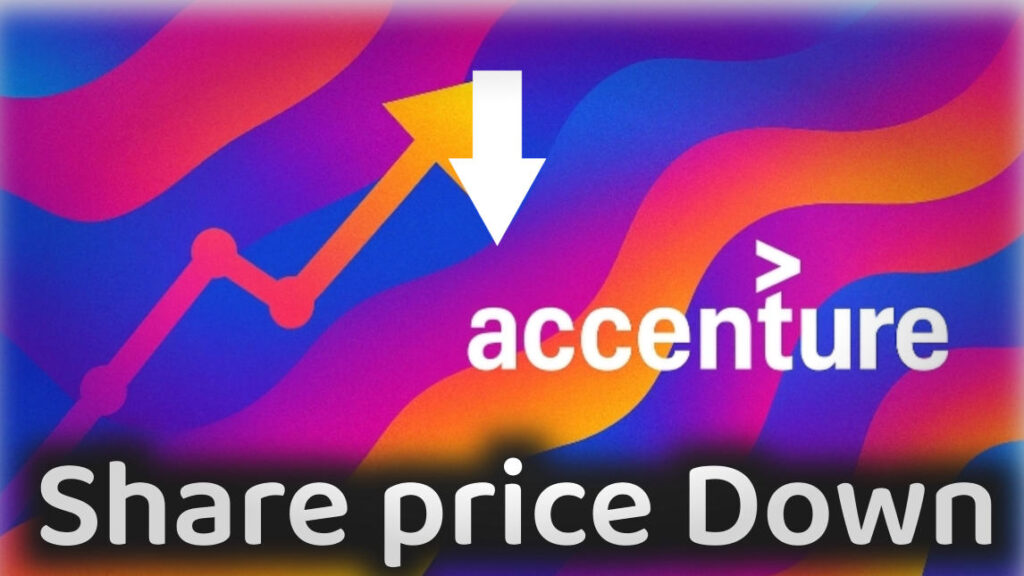🟡 Accenture Share Price Drops
Accenture, the global IT and consulting giant, recently saw its stock price drop sharply, despite reporting better-than-expected earnings. Sounds strange, right? But here’s where the story gets deeper than just numbers and headlines.
In Q3 of its fiscal year, Accenture reported earnings per share (EPS) of $3.49, which was well above Wall Street estimates. Revenue also reached $17.7 billion, beating forecasts. Sounds like a reason to celebrate. But instead, the share price fell by around 7%, making it one of the top losers in the stock market that day.
So the real question is: why?
🔍 Behind the Numbers: What Spooked Investors?
Let’s break this down. While the earnings and revenue were impressive, another key metric didn’t go well: bookings.
Bookings represent the value of new contracts and projects signed during a quarter. And here, Accenture saw a 7% decline. Instead of the expected $21.5 billion, bookings were only around $19.7 billion. That’s a big deal, because bookings are like the fuel for future revenue. Less fuel, less growth.
And it’s not just the numbers. Investors noticed that public sector demand in the U.S. has slowed down. Federal contracts, once a strong revenue stream, are taking longer to close. Some even got delayed or downsized due to tighter government spending. That’s a sector where Accenture had a big footprint, and now it’s under pressure.
🧠 The Bigger Picture: Is AI the Answer?
Accenture is not sitting idle. In fact, it’s already pivoting towards the future with AI. A new division called Reinvention Services was just created, focused purely on AI and business transformation. It merges consulting, strategy, and operations — all powered by artificial intelligence.
Leadership changes are also happening. The company elevated one of its top executives to lead this AI transformation. The goal is clear: make AI the center of everything they offer to clients.
But here’s the tricky part. While everyone is talking about AI, clients are still unsure about how much to spend on it. The interest is high, but the budgets are tight. Businesses want to see results before they commit millions to AI transformation. This hesitance slows down Accenture’s momentum, at least in the short term.
💸 Valuation: Is the Stock Undervalued?
Accenture’s share price recently touched a 52-week low near $275, far below its previous highs of around $398. That’s a sharp drop for a company of its reputation and stability.
Yet most financial experts still believe the stock is fundamentally strong. The company has low debt, solid profit margins, and a market cap of nearly $191 billion. The forward price-to-earnings (P/E) ratio also remains reasonable. So while the market reacted negatively, the fundamentals aren’t broken.
🚦 Guidance and the Road Ahead
Despite short-term worries, Accenture raised its full-year guidance. The company now expects earnings per share between $12.77 and $12.89, slightly higher than previous projections. Revenue growth is also expected to stay strong, in the range of 6% to 7% in local currency terms.
So why the drop, again?
The market seems to be saying: “We see your good results, but we’re not sure how long it’ll last.” In other words, investors want to see more consistency in bookings and proof that the AI strategy is working before getting excited.
📈 Opportunities or Risks?
Here’s where it gets interesting. Some see the recent dip as an opportunity to buy a world-class company at a discount. Others feel the company needs to prove itself over the next 2–3 quarters.
Either way, all eyes will be on:
- Next quarter bookings: Will they bounce back?
- Federal contracts: Will delayed projects start moving again?
- AI projects: Will Accenture land big deals in this space?
- Client budgets: Will companies finally loosen their wallets for transformation?
These answers will decide whether the stock rebounds or continues to slide.
🌍 Industry Position
In the wider consulting and IT world, Accenture still remains one of the leaders. It operates in over 120 countries, serving clients across every industry — banking, healthcare, technology, retail, and more. It employs over 770,000 people globally and brings in over $64 billion in annual revenue.
Competitors are growing too, but not many have the scale, trust, or client relationships that Accenture has built over decades. This gives it a strong base to experiment, invest in innovation, and recover from short-term dips.
💬 Points to Ponder
This isn’t the first time a stock has dropped after good results — and it won’t be the last. Markets often react not just to “what happened,” but to “what might happen next.” That’s what’s happening here.
The real concern isn’t about today’s earnings, but about the future pipeline. If Accenture can turn AI curiosity into real, high-value deals, the market will reward it again. If delays continue, the stock might struggle for a while.
Still, this is a company that’s survived tech shifts, digital disruptions, and even a pandemic. If history is any lesson, it knows how to adapt. But the question remains:
Will investors be patient enough to wait?
Only time, and the next quarter’s bookings, will tell.

